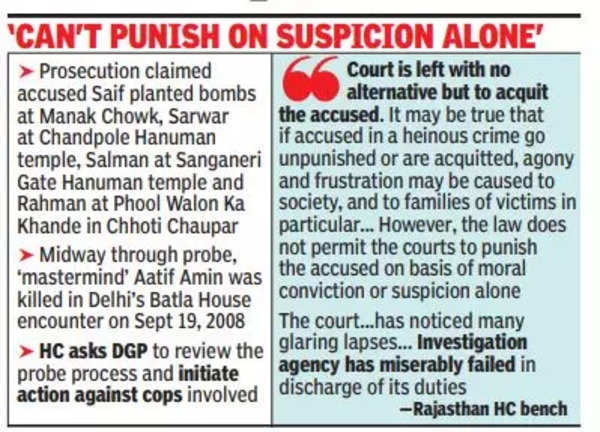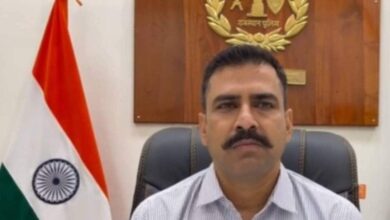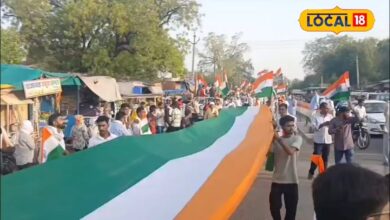Rajasthan HC acquits four men on death row for 2008 Jaipur serial blasts | Jaipur News
“With regard to the totality of circumstances and the evidence on record, it is difficult to hold that the prosecution had proved the guilt of the accused by adducing cogent and clinching evidence,” the division bench of Justices Pankaj Bhandari and Sameer Jain said of the December 18, 2019, verdict of the trial court.
Among the acquitted, Mohammed Saif has been in jail for 15 years. Two others – Mohammad Sarwar Azmi and Saifur Rahman – have spent 14 years behind bars, while the fourth, Mohammad Salman, has been incarcerated for 13 years.
The division bench upheld Salman’s plea that he was a minor aged 16 years and 10 months at the time of his arrest. It also dismissed the prosecution’s appeal against the trial court’s acquittal of a fifth accused, Shahbaz Hussain, for want of evidence.

Court blasts Raj ATS, orders action against cops who probed Jaipur blasts
While acquitting the four men convicted by the trial court for the 2008 serial blasts in Jaipur, the Rajasthan HC slammed the state police’s ATS for the manner in which it went about probing the eight successive blasts and directed the DGP to review the process and initiate action against the cops who were part of the probe. The chief secretary will monitor the inquiry.
The court’s order acquitting the four suspected Indian Mujahideen members – all of whom had been convicted by the trial court of murder and sedition, among other crimes – came on their appeal that was heard along with 27 other petitions.
“To sustain conviction, the circumstances taken cumulatively should form a chain so complete there is no escape from the conclusion that within all human probability, the crime was committed by the accused only and no one else. The circumstantial evidence must be complete and incapable of explanation of any other hypothesis than that of the guilt of accused, and such evidence shouldn’t only be consistent with the guilt of accused, but should be inconsistent with his innocence,” the ruling said.
Syed Saadat Ali, counsel for the four men, said one of the major discrepancies found by the HC was the disclosure statement of Mohammad Saif being recorded nearly four months after the blasts.
The first arrest was of Shahbaz, almost three months after the blasts. He was traced on the basis of an email claiming responsibility sent from a cyber cafe in UP’s Sahibabad. The ATS arrested Saif in December 2008, followed by Azmi in January 2009, Saifur in April 2009 and Salman in December 2010.
The defence counsel argued that the ATS had no evidence to corroborate the travel history of those convicted. “Police claimed the suspects reached Jaipur by bus on May 13, 2008, and returned to Delhi by Shatabdi Express the same evening. But it couldn’t produce any evidence,” Ali said. He also pointed to “discrepancies” in evidence presented by prosecution regarding pellets found in the bodies of blast victims. “The sketches of probable suspects were drawn in Jaipur, but not taken on record. Also, the IO was present during test identification parade in a clear violation of rules.”
The court noted that the frame numbers of the bicycles that were used to plant explosives didn’t match with bill books produced by the ATS.
Our pain and misery now reduced to a joke, laments blast survivor
Ram Babu Yadav lost his brother Radhey Shyam in the mayhem of the May 13, 2008 serial blasts that rocked Jaipur, killing 80 and maiming more than 170. On Wednesday, almost 15 years after that horror, he felt his heart sink again as the Rajasthan high court acquitted the four men convicted of the eight successive bombings on grounds of multiple lapses in the investigation and the prosecution’s failure to prove their complicity.
“What is left for me to say now? The blasts took place in 2008, for which four of the accused were sentenced to death in 2019. Three years later, we are looking at a new verdict that none of us could’ve imagined,” Ram Babu told TOI.
A survivor who didn’t want to be identified said the authorties might as well shut the probe for good. “Our pain and misery have been reduced to a joke. Why didn’t anyone check what police was doing all these years? In a way, the acquittals are a good thing because now this charade will finally end,” he said.
Sachin Gupta’s two daughters were among the victims in the attack. He has been organising blood donation camps since in memory of Mehak (6) and Diya (3), finding in social service a semblance of succour. The convicted quartet’s acquittal brought back the pain of loss that the passage of time seemed to have eased.
Families of several other victims and wounded survivors of the blasts said the government should hold the police accountable for what happened in the courtroom. “This (the verdict) sends out a wrong message. None of us expected this outcome. I hope the government is preparing to challenge the acquittals, because this is not justice,” said Rajendra Sahu, whose wife Sushila was killed in one of the explosions.




